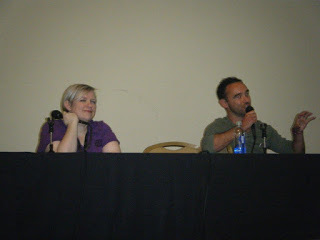Rob Nunn's Blog: Interesting Though Elementary, page 14
March 28, 2021
Interesting Interview: Tamar Zeffren
Tamar Zeffren is a special kind of Sherlockian. She's not one to crave the spotlight but she is everywhere! The interesting thing is, you don't know she's there until you look for her. And then you'll notice that Tamar is one of the amazing folks that is putting her time and expertise into so many things! You'll see her name in the Baker Street Journal, the Baker Street Almanac, as a member of the Adventuresses of Sherlock Holmes, one of the Baker Street Babes, on the Board of Advisors for Sherlockian.net, the faculty of The Priory School, keeping the Baker Street Irregulars Trust site humming.... Seem like a long list? I'm sure I've missed a thing or two!
But here's what's great about Tamar: she doesn't lead with any of that stuff; you're just naturally drawn to her charm. In fact, I've known her for a while and only learned about some of her roles in Sherlockiana as I was doing research for this interview! Tamar seems to be involved in so much and know so many folks in our hobby because she is a genuinely nice person who also happens to be wickedly smart. So it's no wonder that people want to work with her on projects. If you're a Sherlockian on the east coast, this is a name and face that's familiar because she's sure to be found in the middle of a group of fun-loving folks at an event. And with all of the Zoom meetings over the past year, Tamar's smile is probably familiar to a lot more folks from across the country. Whether you have known her for years or she's the lady that said that smart thing that really stood out on your last Zoom meeting, you know that Tamar Zeffren is definitely going to be an interesting interview!

How do you define the word “Sherlockian”?
A person with an excess of excitement and whimsy who has decided to deploy it on behalf of anything which relates to Sherlock Holmes. Fortunately for Sherlockians, that can truly be anything.
How did you become a Sherlockian?
My introduction to Sherlock Holmes was, conveniently, buttressed around a mystery. I first encountered at home the Bantam Classics two-volume mass market paperback. This version was so cheaply printed that, no matter whether I turned one page or 100, tell-tale Canonical smudges ended up in many unwanted places. This Whodunnit, or more accurately Whoreadit, was easy to solve.
My interest in Holmes dwindled during my adolescence, possibly because I did not know anyone else who was interested in reading or discussing the stories as often as I wanted to. While in college, my interest rekindled and one of the first purchases I made to lend my dorm room a homier (Holmesier?) feel was a new edition of the Canon. This sparked a sudden impulse to Google Sherlockian groups in New York; this expedition first led me to the Adventuresses of Sherlock Holmes (ASH) under the leadership of the truly incomparable Susan Rice and the ASH Wednesday dinners on the first Wednesday of every month.
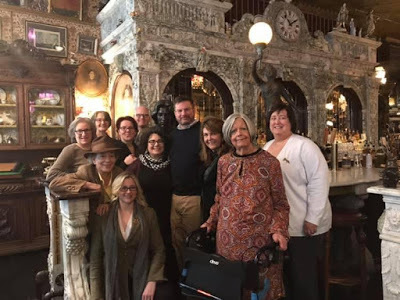
I feel very fortunate that ASH was my first introduction to a Sherlockian group, not only because it is such a welcoming group, but because so many incredibly knowledgeable Sherlockians from India, Sweden, and everywhere else would visit New York, or pass through, and end up holding court at an ASH Dinner. These gatherings exemplify the literally global reach of Sherlockian friendships—and nothing could stand as a more fitting tribute to the bonds between Holmes and Watson which animate the entire Canon.
Through this channel I ended becoming aware of and participating in many other groups—and Sherlock Holmes and Sherlockians have remained a “fixed point” for me ever since. My life is immeasurably enriched by online and offline Sherlockian gatherings, projects, and above all, people. I even have Holmes to thank for appearing at Lincoln Center(!) with other Baker Street Babes on a panel in May 2016 about “The Forensics of Storytelling” discussing the science of Sherlock Holmes, narrative genres and techniques, and lessons for storytelling and experiential design.
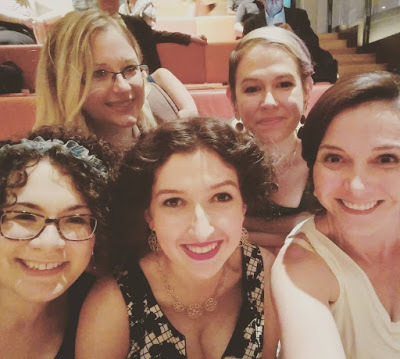
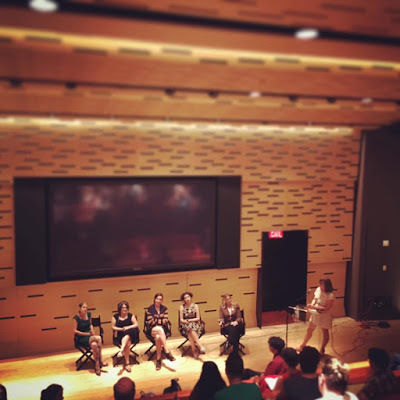
What is your favorite canonical story?
“The Man with the Twisted Lip.” Such a piquant mystery. And that’s even before you take into account that Watson’s wife calls him James.
Who is a specific Sherlockian that you think others would find interesting?
Talk about an embarrassment of riches. To pay tribute (again) to a quotation that Bob Katz often shares, “Come for the stories, stay for the friendships.” (If I have misquoted, I’m sure I will hear of it.) Every Sherlockian I have had the privilege of meeting is interesting!
Two fascinating individuals who come to mind are 1) Peggy Purdue and 2) Andy Solberg. Each is a remarkable and kind Sherlockian with a range of fascinating interests and the ability to hold a spellbinding and erudite conversation about any of those.
[Reader, I have also cheated on this question. See further below.]
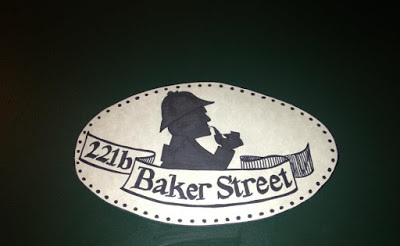
What subset of Sherlockiana really interests you?
As someone with no musical talent but a surfeit of enthusiasm (I consider myself as a professional “audience member”), I find musical homages to Holmes, from parodies deployed at scion meetings to large-scale productions, utterly brilliant. I hope there is a more concerted effort to collect and preserve those delightful creations so that they can inspire and delight future generations.
What things do you like to research related to Sherlock Holmes?
I am keenly interested—which is not at all the same thing as being skilled—in applying natural language processing (NLP) methods to the Sherlock Holmes stories, and to the astounding output of Sherlockian writings as well. When I ponder the fertile research possibilities inherent in being extract and analyze heretofore unseen, or underseen, patterns across a vast corpus of text, the mind boggles (and addles!). I think a consulting detective would look favorably upon Sherlockians employing this technique to continue exploring his world.
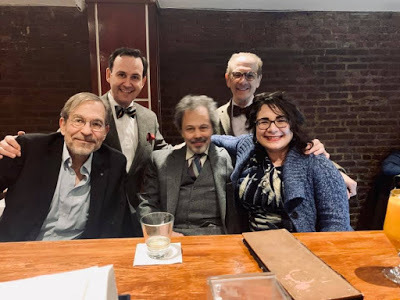
How did you become involved with the BSI Trust and why should more people know about it?
My involvement with the Baker Street Irregulars Trust began in 2014. The inimitable Steven Rothman, stalwart Baker Street Journal Editor and yet another Sherlockian force of nature*, remembered that I am an archivist (that billing sometimes does stand out in people’s minds) and put me in touch with the BSI Trust, the BSI’s institutional archives. The Trust had embarked on a project to post a page about every Annual Dinner, complete with relevant images and archival material from the Trust’s holdings. I began assisting Andy Solberg, who was then Trust Chair, with compiling content for those Dinner pages. My involvement with the Trust has continued as the collection has evolved, including its move from Harvard’s Houghton Library to the Lilly Library at Indiana University.
[*Cheating accomplished]
In 2020, I was asked to assume the role of Content Manager for the BSI Trust website. Work in this vein got off to a slow start in that year, for obvious reasons, but the development of a content pipeline (don’t be surprised when you hear from me on this front) and re-envisioning the user experience is now well underway. In this capacity, I work with Randall Stock, who oversees all websites associated with the Baker Street Irregulars.
The mission of the BSI Trust (necessarily abridged here for space) is to “collect, preserve, and provide access to historical [records]…relating to the BSI and its members and friends.” The Trust is the repository of the BSI’s impact on the Sherlockian world—and the Sherlockian world encompasses multitudes! These records hold meaning not only for BSI members, but for anyone interested in researching numerous aspects of the pursuits of individual Sherlockians and the collective impact of this entity.
Access to archives belongs to all. None of us exist apart from it—our mutual activities today seed future Sherlockian directions, and therefore influence the archival record that will (we hope) endure. Becoming more familiar with the wealth of archives emboldens us to comprehend the impact we can have in this world to which so many devote so much time and that can yield such fulfilling returns.
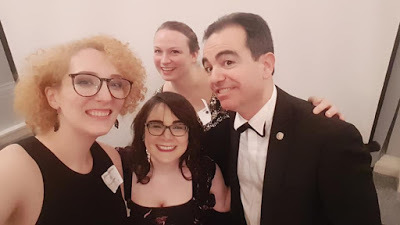
As an avid theater fan, how does that influence how you enjoy the Canon?
It offers me an even greater appreciation for the agility and succinctness of Conan Doyle’s prose, and as well for the incredible acuity that playwrights and actors can bring to reinterpreting that text. It is a pleasure to revel in the texture on the page about, for example, Holmes “scraping upon his violin,” and then to encounter so many visceral elements of such a scene in performance: the chosen passage, Watson’s facial expressions, the ambient noise in 221B, and so forth. Experiencing theatrical interpretations offers me the chance to return to a familiar passage, now imbued with new sensations. What a treat!
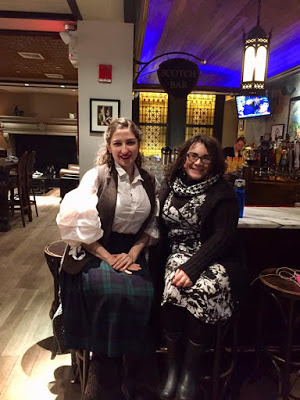
What book would you recommend to other Sherlockians?
Holmes Reads Holmes by my BSI classmate Ross Davies.
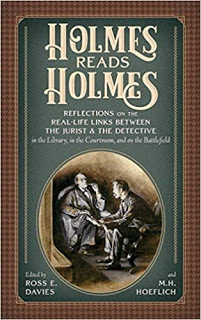
The ramifications of the almost universally virtual landscape that all manner of Sherlockian activities (scions, conferences, book fairs, a day at the Silver Blaze races) have been forced to adapt for over a year now are, of course, still unknown. Even when circumstances safely permit in-person gatherings, I cherish the hope that we will not depart from a a greater commitment to accessibility.
I see an ongoing and deepening focus on local networks, including the revitalization of defunct groups and more focus on smaller conferences that do not only occur in urban metropolises. I hope there will be more conferences jointly organized by a global range of Sherlockian groups; we have so much to learn and share with one another that should not be circumscribed by travel costs. I anticipate further innovation in the audiovisual sphere, especially as that medium has been such an instrument of outreach and cohesion for the Sherlockian community during the current crisis.
Publishing will continue to be a ferment of activity for Sherlockians! However, how much resemblance will today’s publishing environment—scope, research, distribution, publicity, etc.—bear to the landscape of a decade or more from now? “[T]he future will decide.” (NORW)
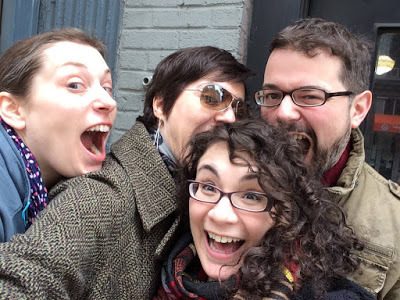
March 14, 2021
Interesting Interview: Tim Johnson
What if there was a place that collected all of the printed Sherlockiana since the beginning of our hobby? And who could we trust to be the keeper of such a magical place? Tim Johnson, that's who!
Since 1998, Tim has overseen the Sherlockian collections at the University of Minnesota, the largest collection of Sherlockiana in the world. He also served as a consultant on the International Exhibition of Sherlock Holmes that has been delighting audiences around the world over the past few years.
That would be enough for anyone to pay attention to Tim. But my biggest reason for wanting to interview Tim this week is his heart. If you've ever heard Tim speak, you'll know what I mean. It's hard to put into writing how heartfelt he is about this hobby, but his big-tent Sherlockian philosophy is evident in everything he says and does. Tim is a fan of all Sherlockians and encourages everyone to join in the fun, no matter how.
We could all be a little more like Tim Johnson.
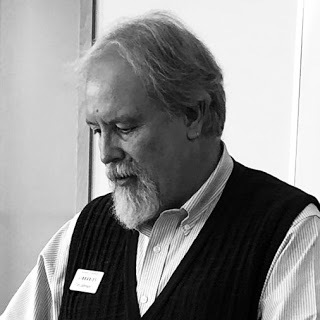
Broadly. And with a sense of jollity. Just for giggles—and in the habit of a librarian—I looked up the word in The Oxford English Dictionary. The first thing I noticed is its longevity. It first pops up in The Bookmanin 1903. “If you decipher this you are a real Sherlockian.” So, it is a word that has been with us for over a century. Some might say it is an aged word, an elderly word. But I prefer to think, in this case, that with age comes wisdom. It is a word chock-full of information, knowledge, and understanding. The question might be, in this continuum of knowing, whether or not it has reached a point of wisdom? I think it has, but the fact that we are still curious about its definition perhaps says something more about us and less about the word itself.
The second thing I noticed in the OED definition is its sense of space or geographical limits. Traditionally, we’ve used the word to describe an enthusiast of the Master and his adventures resident on this side of the Pond or other reaches of the globe, leaving “Holmesian” as the proper term for those in the United Kingdom and to a lesser extent those followers in Europe. I think technology and fandom disrupted that distinction, that the terms have become interchangeable, or ones of preference. Each word has its own lilt, its own poetry, but also its own harshness. “Holmesian” seems a more rounded term, with a bit of gentleness, or at least the appearance of good manners. “Sherlockian” is a bit rough around the edges, with sharp elbows, somewhat indicative of how we sometimes treat each other in a world meant for enjoyment. I find myself using both, depending on the situation. I like to think of them as inclusive, welcoming, playful, and in the end, kind and caring.
How did you become a Sherlockian?
Have I? Or am I rather in a state of becoming? I’m teasing you a bit, but I do think the identity also contains some sense of still being on the road, still learning and experiencing. If you want to try and nail me down, then I’d say I started to become this thing when PBS first aired the Brett series on “Mystery” starting in the mid-1980s. I read the stories as a kid and enjoyed the Rathbone/Bruce movies as a Saturday television matinee, but these were pastimes or diversions, not something taken seriously. Brett was another matter entirely. Colleagues from work (these being seminary faculty along with me as archivist and student) would gather to watch the stories and discuss them over following days. It was the first time I seriously engaged the adventures.
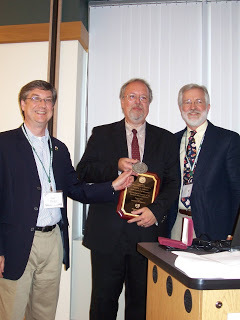
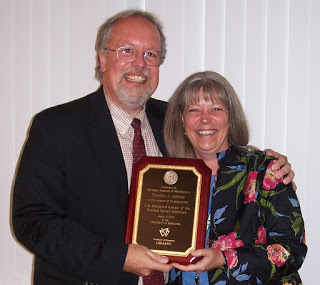
A second waypoint would be my introduction to Sherlockian society, first at the fiftieth anniversary conference of the NorwegianExplorers in 1998, three short months after I started my position as curator at the University of Minnesota, and then again the next year when I received my first guest invitation to the Baker Street Irregulars birthday festivities in New York. These occasions informed me that there was a whole other world and level of engagement with Holmes and Watson that I never experienced before. Somewhat solitary person that I am, I was unfamiliar, experientially and existentially, with enthusiasts or devotees on this level.
A third waypoint, and one I will always be thankful for, came with my attendance as a Guest of Honor (along with my friend and colleague, Peggy Perdue) at the 2015 Sherlock Seattle Convention. I have written elsewhere of this encounter (https://hdl.handle.net/11299/200027), so I won’t go into detail here except to note that this experience changed my life. It was an insightful, reflective, and moving weekend that will stay with me to the end of my days and brought me into the world of Sherlockian fandom.
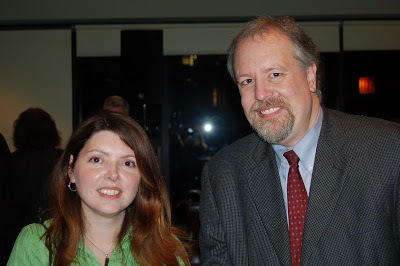
Would I have become (or am becoming) a Sherlockian if it had not been for my work at Minnesota? It is a question I sometimes ask myself. If I’m honest, I would probably say no. I have as much enthusiasm for baseball or model railroading or hunting or fishing as I do for Mr. Holmes. I’ve watched trains and wet a line since the age of three. But I’m glad that in 1998 the Norwegian Explorers and The Friends of the Sherlock Holmes Collections got their hooks into me and started to draw me into this delightful world and group of friends and acquaintances that makes life ever so rich.
What is your favorite canonical story?
From the time I found out a childhood friend’s older brother served on a nuclear submarine, I’ve been fascinated by these ships. So it’s probably no surprise, then, that I am rather fond of “The Adventure of the Bruce-Partington Plans.” There are a number of other reasons why I am drawn to this tale, some by content, and others by association.
First, it is one of few adventures that features that somewhat mysterious older brother, Mycroft. I thoroughly enjoyed Charles Gray’s performance as Mycroft in the Granada series. I am drawn to Mycroft as a character and wish Doyle had developed him further. From Mycroft it is a very short step to spies, the British government, and international intrigue, something else that occupies some of my reading and entertainment (for example, the late John le Carré, Len Deighton, House of Cards—the British version, please—and the Johnny Worricker trilogy).
Second, there are a ton of interesting characters and locations in this tale. Plus, it includes trains and an emerald pin. Finally, it was the BSI investiture of someone I was pleased to know, if ever so briefly, and whose name I carry in my job title: E. W. McDiarmid.
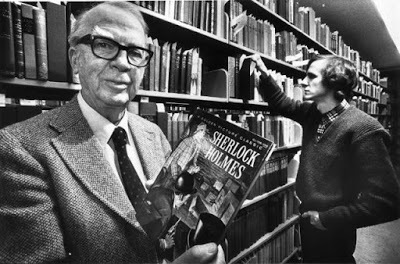
Who is a specific Sherlockian that you think others would find interesting?
Well, I hope he won’t be embarrassed by this answer, but it would have to be perhaps the first Sherlockian I ever met, Dr. Richard (Dick) Sveum. Dick attended my public presentation, part of the day-long interview I had for the Minnesota position, and called me after I accepted the post to welcome me to Minnesota and alert me to the upcoming Norwegian Explorers anniversary conference. Curiously and comically, I did something I don’t think I’ve ever done, before or since, during that phone call. I asked if Dick was the elderly gentleman sitting near the back during my presentation. It must have been his beard that fooled me (it fluctuates in length depending on the season; being January at the time of my interview, it was quite long), but it was (and is) totally out of character for me to describe someone like this, especially to their face (or over the phone). We chuckle about it now, but I was horrified as soon as the words flew out of my mouth. I must have been overly excited about coming home to Minnesota!
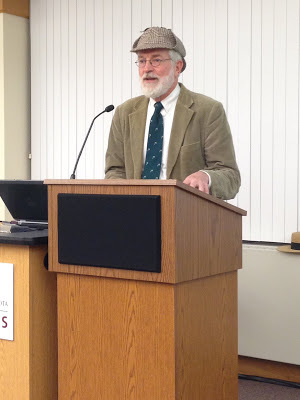
Dick is interesting in so many ways. He’s a very accomplished, knowledgeable, and networked collector as well as a compassionate, intelligent, and community-spirited physician (lately retired). He reads widely across a number of areas and makes connections in the manner of the late James Burke that can take your breath away. If you ever go booking with Dick, you’ll need your best walking shoes and plenty of stamina. I was full of enjoyable aches and pains following such a stint with Dick across Manhattan during a Birthday Weekend. He also enjoys many things Scandinavian, the outdoors, and being a grandfather—things we share. Our children overlapped during high school, so there’s another family connection. He’s generous to a fault and someone I deeply value as a friend. He couldn’t have been a better introduction to Holmes and a welcoming presence as I returned to Minnesota.
What subset of Sherlockiana really interests you?
After my experience in Seattle, I would have to say that it is the creative energy and content I have seen and read coming out of the newer fandom. I feel like I’ve just scratched the surface and need to read a lot more fics, view a lot more videos, and just sink myself into this ocean of material and experience. After Seattle, a highlight for each year has been the 221B Conin Atlanta, and recently, the gathering in Portland, Oregon.
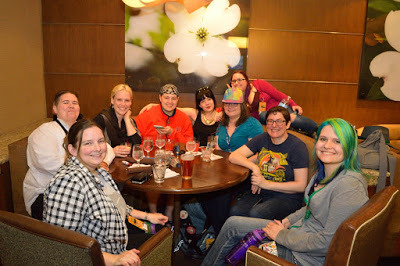
On a related note, I’m interested in ephemera, the hard to collect and fleeting material that is here one day and gone the next. In a digital age where so much is being created on electronic platforms, it is both hard to capture and preserve. I don’t know how many times I’ve clicked on a link only to discover that the thing I was interested in is no longer there. I am afraid of a “digital black hole” that might confront students, researchers, archivists, and fans in the future because so much of this material is transient by nature. I’ll never be able to collect it all; the best I can hope for is a representative sample.
What things do you like to research related to Sherlock Holmes?
Here your question touches on things I would like to do, but have not yet had time to really dig in. Some of this involves Doyle and some Holmes. On the Doyle side, I’m interested (as someone with a theological studies/church history degree) in his epistemological and spiritual pilgrimage. Coming, as he did, from a family with a deeply held Catholic experience, what caused him to break with this tradition in search of something else? What did he find objectionable in the Catholic faith? What was he looking for and why did Spiritualism seem to satisfy this religious longing? What impact did World War I have on his faith? (My grandfather was in the war, so there’s a personal angle to this question.)
I also would like to dig a bit more into Doyle’s interest in photography, an area that touches on another collection I curate, the Mertle Collection on theHistory of Photomechanics. I like it when there are crossovers between collections and ACD’s work in photography would be an interesting avenue to explore.
On the Holmes front, and given my life-long interests in railroads, I would enjoy the chance to dig deeper into the junctions between rail transportation in the United Kingdom and the adventures. There are so many stations, for instance (some of which I have visited or transited through) that seem to call out for further attention. Or the routes and timetables. I have barely touched any existing writings on Holmes and railroads, so that would be my starting point: to build a bibliography of extant writings and then take it from there.

Beyond trains, earlier I mentioned an interest in espionage. I’ve played around with a few ideas that might develop into a short story (or stories) about Holmes (both brothers) and the early history of the Secret Service in the United Kingdom. I know others have written some fictional works about this, but I would still like to explore the possibilities. Having lived in Chicago for nearly two decades, I’m also intrigued by Holmes’s experience in the Windy City.
What are one or two of your favorite items in the UMN Collections?
The first items that come to mind are the four original manuscript leaves from The Hound of the Baskervilles. First, because they are so iconic in terms of the Canon. Second, because they are simply beautiful to look at. And, third, because these leaves are connected with a very special tour I gave to a grandfather and granddaughter that moved us to tears and confirmed that I was doing the right work in the right place. It is a longer story, told in part elsewhere (http://umbookworm.blogspot.com/2018/08/a-spark-in-dark-hollow-of-my-hand.html), but I’ll give you the “Reader’s Digest” version. During this tour of the Collections and the underground caverns, I was in the presence of a very conversant and well-read teenager who was absolutely thrilled with everything I showed her, from Beeton’s Christmas Annual to Frederic Dorr Steele and beyond. The mystical moment, however, was when I set one of the Houndmanuscript pages in front of her. Here she was, face to face with her favorite story, in the handwriting of her favorite author. She wept at the sight, as did we who watched. We were all overcome by the moment. I still get choked up in the recollection. I was meant to be the curator of the Holmes Collections for just this reason and this instant. It was one of those precious events that confirmed my choice of profession.
How have you seen Sherlockiana change over your tenure with the Collections?
Seven years before my tenure marked the first year that women were admitted as members to the Baker Street Irregulars. I think this change was still playing out and in its early days when I began as curator in 1998. Since then, now twenty-three years into my tenure, the role of women and the LGBTQ+ communities continue to influence and lead Sherlockiana in energizing and productive ways. But in some fashion we’re still taking baby steps and have a long way to go. I look forward to a day when someone other than a white cis male leads the Baker Street Irregulars or edits The Baker Street Journal.
People of color are few and far between. Has institutional racism been present in Sherlockiana from its beginnings and overdue for eradication? At the same time, beyond the communities I see in Portland or Atlanta, the traditional Sherlockian world is getting grayer and older. I do not know if a younger cohort is waiting in the wings to step in, or if “traditional” Sherlockiana might be a thing soon past, evolving or merging into something new and wonderful.
What book would you recommend to other Sherlockians?
Just one? Then let it be a book that touches on both Doyle and Holmes, one I enjoyed and would wish for more attention: Andrew Lycett’s The Man Who Created Sherlock Holmes: The Life and Times of Sir Arthur Conan Doyle (Free Press, 2008). If I squeezed in a second it would be Daniel Stashower’s Teller of Tales: The Life of Arthur Conan Doyle (Henry Holt & Co., 2001).
Where do you see Sherlockiana in 5 or 10 years from now?
Do I see it or hope for it? In either case, I would desire a younger and more diverse Sherlockiana. The promise is there. But it will take hard work; meaningful and deep relationships; and open arms to make it a reality.
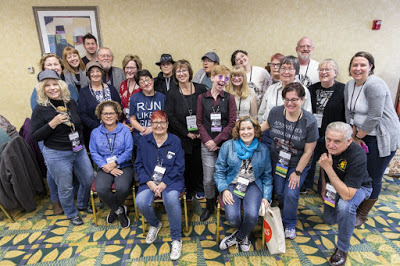
March 6, 2021
When I Glance Over My Notes and Records [FIVE]
Last weekend I had a scion society meeting, and at this group everyone presents a paper on the month's story. Normally, I write up an essays to present that looks at some historical aspect or analyzes the text. This month, we were starting the Canon over again, so it was time to do A Study in Scarlet.
Luckily, I had recently written a piece about STUD called "A Study in Steadfast," in which I retell the events of STUD from the viewpoint of Watson's bullpup. It had been published in the latest issue of The Watsonian, and no one from this group was a subscriber to that journal, so I didn't feel like I was cheating by reusing the piece.
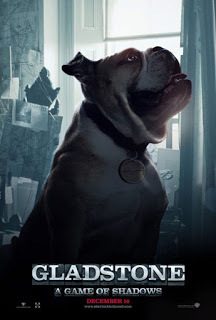
Once I had committed to use that piece, things felt weird. I realized that fiction isn't my preferred method of Sherlockian writing. Looking over most of my writing, it's either expository or persuasive. I could be arguing that Hattie Doran is one of the worst people in the Canon or that The Greek Interpreter is a piece of fiction that Watson made up. Maybe I'm speculating about Holmes's cousin Verner or doing a deep dive into who Charlie Peace was. Either way, I tend to stick to the non-fiction stuff and fiction pieces aren't my go-to writing style.
But when they are, I make things weird.
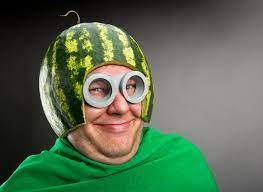
My write-up for STUD was telling a story though a dog's viewpoint. I rewrote the entire Canon under the pretext that Sherlock Holmes was actually a criminal. And I have a piece slated for The Sherlock Holmes Society of London Journal that imagines a Sherlockian society meeting that takes place in Hell.
Maybe I don't write fiction too much because I'm afraid of where my mind ends up. It's pretty twisted in here; it's time to get back out and research something.

February 28, 2021
Interesting Interview: Anastasia Klimchynskaya
Anytime you have a conversation with Dr. Anastasia Klimchynskaya, you can just feel the intelligence radiating off of her. Whether it's online or in the hubbub of the BSI weekend, Anastasia can go toe-to-toe with anyone in fandoms. Some of us are specialists in Sherlockiana, but it might be said that her specialism is omniscience of fandom. She's written articles for the layperson and for academics on many areas of fan culture, and is currently co-hosting Sundays with Frankenstein at The Rosenbach in Philadelphia. From Frankenstein to Supernatural, she knows her stuff!
Anastasia is a postdoctoral scholar at The Stevanovich Institute on the Formation of Knowledge in Chicago, IL and hails from Belarus. In 2013, she won the Morley-Montgomery Award from the Baker Street Journal, was invested in the BSI in 2018, has written for I Hear of Sherlock Everywhere, Den of Geek, and Cinema Sentries on our favorite detective. But don't let her credentials intimate you! Anastasia is such a cool and welcoming person, that within minutes of meeting her for the first time, you will be wrapped up in her world. So let's get into the world of Dr. Anastasia Klimchynskaya!
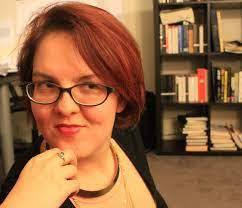
How do you define the word “Sherlockian”?
Honestly, just someone who loves Sherlock Holmes and embraces at least some of our traditions.
How did you become a Sherlockian?
Funny story, that – I love telling it.
When I was in fifth grade, I loved reading Nancy Drew novels, and my mother (who grew up in the Soviet Union, where Holmes was very popular) decided I needed something more serious, and, understanding how much I loved mystery stories, gifted me a copy of the Adventures and Memoirs of Sherlock Holmes. Just those two, so of course it ends with him going over the Reichenbach Falls! My mother thought those were the only story collections, and so for a good decade or so, I believed Sherlock Holmes did indeed die! (I know, very Victorian of me). Then, when BBC Sherlock came out alongside Guy Ritchie’s movie and there was all this hype, I decided to revisit those stories and discovered that, well, there were a lot more of them than I originally thought and Holmes returns from the dead.
That moment in the 2010s was kind of a perfect storm of Sherlockian content, and it was impossible not to get swept up in it – I was at the University of Chicago at the time, and have fond memories of attending scion meetings come hell or high water (or some lovely freezing Chicago weather), taking public transit as far as I could, which point Susan Diamond (who also became my mentor and guide into Sherlockiana, and whom I miss dearly) and her husband would pick me up and drive me the rest of the way.
And then, the next year, as I studied abroad in Paris just as the second season of Sherlock aired, I have fond memories of papering the Rue des Boulangers with signs that “Moriarty is Real.” It was in Paris that I wrote a piece that would eventually be published in the Baker Street Journal and go on to win the Morley-Montgomery Award, at which point Steve Rothman called me and insisted that I really, really had to come to the BSI Weekend because, well, I had to be there to receive it and I haven’t stopped going since.
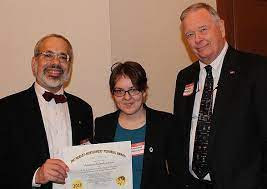
What is your favorite canonical story?
I love the stories in which Sherlock Holmes is confronted with a seemingly supernatural phenomenon and must prove that there’s a natural, rational explanation; to me, that encapsulates not just who Holmes is, but what he’s symbolized, both to the Victorians and to us – the triumph of a “modern” rationality. So, The Hound of the Baskervilles, the Devil’s Foot, and the Sussex Vampire.
Who is a specific Sherlockian that you think others would find interesting?
There’s so many amazing Sherlockians out there doing amazing things, but if you’re giving me the space to give a shoutout to only one, I have to say Ross Davies. That man is doing so many things all at once, and he must have called me at least half a dozen times in the past year asking me to write an essay for a Manuscript Series, or do a footnote for an almanac he’s publishing, or work on an annotated edition he’s decided to put out, or be on a Committee for the Arthur Conan Doyle Society that he founded. I don’t think it’s possible for one person to singlehandedly revitalize Sherlockiana, but he’s certainly coming very close to it!
What subset of Sherlockiana really interests you?/What things do you like to research related to Sherlock Holmes?
I’m going to answer both of those questions in one, because they’re very connected for me.
As academic whose training is in literary studies, and who considers herself a cultural historian of sorts, I’m always interested in examining texts and characters as cultural evidence. I’m fascinated by the way works of fiction or characters can seize and express something that’s in the air at a moment in time, something of the hopes and fears and anxieties of a period or a society.
And that’s a really rich field to explore with Sherlock Holmes: he represents, as Michael Saler has so convincingly argued, the re-enchantment of a modern world “through means entirely consistent with modernity.” He encapsulates not just the values of the Victorians but many of the cultural trends and concepts and paradigms that still define our world today: the idea of the unconscious and of looking “beneath the surface” based on external signs, the practice of reconstructing past events based on traces and clues (reminiscent of the practice of paleontology emerging at that period), the emergent sciences of sociology, anthropology, and statistics through which both individuals and groups can be understood, the valorization of concepts like rationality and objectivity….I could go on.
How has being an academic influenced how you enjoy Sherlock Holmes?
That’s a very interesting question, because for a while, I really conflated academic literary scholarship (which is what my degree is in) with Sherlockian, Game-playing writing of the kind that appears in the Baker Street Journal. Which is not to say there’s no overlap between them, but academic scholarship tends to be more serious, whereas the Game, as it name suggests, is more playful, more about seeking out tenuous connections and exploring them and reveling in possibility. It rejoices in maybes and perhaps and what-ifs. An academic article would say that there’s no proof Holmes and Freud had ever met, but a Sherlockian would point out that their dates overlapped, and Holmes was presumed dead for three years, and what if. Sorting out those differences took a few years.
Still, I think there are some similarities between the two– Holmes always seeks clues, traces, external signs of secrets hidden beneath the surface, and that’s my approach to literary study as well: to take literary texts as pieces of cultural evidence, to consider their language, their characters, their symbols, and their allegories as clues, as signs, of what was “in the air” at a moment in time. I actually once wrote a short piece, which I’d really love to dig out and publish somewhere, titled “the Sherlock Holmes Method of Literary Analysis,” describing precisely that. So I think if anything, it’s that: this idea that if you look close enough, the most minute details in a text can function as clues for something larger, something lurking beneath or within.
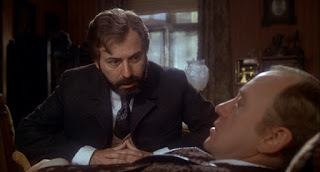
What are some trends in Sherlockian fandom do you wish more people knew about?
Just…the sheer absurdity of some of it (in a good way). The way we have all these traditions – we pretend Holmes was real, and his creator fictitious, and actually take that seriously, and roll with it, and publish whole books based on that premise. The way we meet every January as close to January 6 as possible, because that’s Holmes’ birthday, because in one of the novels they’re hungover on January 7 and that must be because of a birthday celebration, and so we absolutely must all fly to New York every year to commemorate that. We argue over the location of Watson’s wound and how many wives he had as if they’re as important as the connotations of a line of Hamlet.
There’s something so joyful, so irreverent, so whimsical about it all, all these adults who find enchantment in this kind of game of pretend (which applying immense intellectual prowess to these pursuits), and I really wish more of the world at large knew that something like that exists.
What book would you recommend to other Sherlockians?
Just the one? Well, recently I’ve really enjoyed Theodora Goss’ trilogy, which begins with The Strange Case of the Alchemist’s Daughter, and includes Holmes and Watson, as well as Mary Jekyll, Diana Hyde, Justine Moritz/Frankenstein, Beatrice Rappacini, and Catherine Moreau.
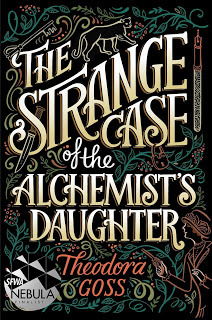
Where do you see Sherlockiana in 5 or 10 years from now?
You really had to throw me a curveball by asking this question during a pandemic, huh? I don’t think any of us know what anything will look like a few months from now, let alone years. Though, since I’m a science fiction scholar, asking me about a decade in the future makes me begin imagining things like implants in our brains and humans on Mars.
But, to be a little more serious: I think the pandemic has changed, well, everything, and I’m of course wondering about which of those changes will last and transform Sherlockiana into something different. For one thing, many of the places where we hold the BSI Weekend in New York have since closed, and I’m sure we’ll find new ones while keeping the memories of the old ones alive (we always have, since the BSI was started in the 1930s), but it has certainly led to a lot of conversations, in the wee hours of the after-after-party of this year’s BSI Weekend, of what our celebrations will look like in the future, and at what price point they’ll be, and what tradeoffs we want to make between accessibility/affordability and remaining near our familiar stomping grounds around Grand Central Station. I don’t have any answers for you on that score except to say that I think we’re at a crossroads of possibilities and will have to decide what we want Sherlockiana to look like a decade from now.
I do think one thing the pandemic has done is sped up a transformation that was already happening and which will continue happening, which is Sherlockiana gaining a steadier online presence. When I first discovered scion societies a decade ago, I found a plaintext list of my local scions on a website that looked like I’d been hand-coded in the 90s and sent an e-mail asking when the next meeting was. Now, of course, we’re meeting on Zoom, most of the scions create Facebook events for their meetings, and Scott Monty does an amazing job keeping everyone updated on Sherlockian news through I Hear of Sherlock Everywhere. It’ll definitely take away a little of that secret society feel that I thought the BSI and various Sherlockian traditions have always had, but on the other hand, it gives greater access to anyone who may want to join.
February 14, 2021
Interesting Interview: Paul Thomas Miller
Get ready, folks! This week's interview is with the Monty Python of Sherlockiana: Paul Thomas Miller. If you're on Sherlockian Twitter, you are probably well aware of how brilliantly twisted the man is. Whether it's making fortune-telling cards inspired by the psychic ghost of Silver Blaze, ruining the game of Guess Who? for his family, publishing a book about unbelievable Sherlockian facts, or adding delightfully deadpan contributions to The Watsonian Weekly, Paul's manic energy makes the internet a daily nuthouse for Sherlockians.
But he's not just insane; the man knows his Canon. Paul put out a new chronology in 2019, based on the premise that everything John Watson says is the absolute truth. He co-created a wickedly hard treasure hunt for the John H. Watson Society. And his paper at the recent Shingle of Southsea meeting on Holmes and women was insightful and echoed sentiments of past Sherlockians.
Paul's canonical knowledge with his off-the-wall creativity would have been enough to warrant getting to know him, but Paul is also the driving force behind Doyle's Rotary Coffin, a Sher-, I mean HOLMESIAN group who celebrates any interpretation of Arthur Conan Doyle's most famous creation, no matter how outlandish. And his latest book, Was Sherlock Holmes an Elephant? is such a perfectly executed piece of... well I don't want to ruin it for you. Needless to say, Paul Thomas Miller is a real boon to our hobby and you're about to get a peek at how he works!

How do you define the word “Sherlockian”?
A Sherlockian is a Holmesian who lacks manners and goes about using first names when they haven’t even had a proper introduction.
A Holmesian is someone with a special interest in Sherlock Holmes. Whether that is the Sherlock Holmes of the original stories, a TV show, a film, pastiches or something else entirely doesn’t really matter. What matters is their enthusiasm for The Great Detective.
How did you become a Sherlockian Holmesian?
By degrees. I’d read some of the stories when I was younger but the real mania kicked in when the Benedict Cumberbatch series came out. When I watched A Study in Pink I kept recognising little bits from the stories I’d read. I think the “Rache” scene was the main one. That made me go back and read the entire Canon. I got hooked, wanted to know more and ended up reading a few bits of Writings upon the Writings. I fell in love with things like .
Finally I read From Holmes to Sherlock by Mattias Boström. That introduced properly me to the wider Holmesian world. I joined The Sherlock Holmes Society of London, where I found everyone so welcoming and kind. But I wanted a local society to join too. When I couldn’t find one, I created my own – The Shingle of Southsea. I’m the only member and that suits me just fine – I cleaned up at the awards ceremony we had in May 2018. And I always win at the quizzes. We publish our minutes online after every meeting - http://shingleofsouthsea.blogspot.com/
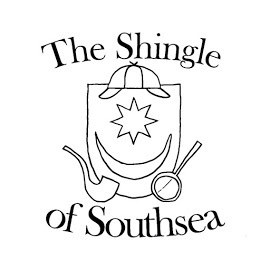 What is your favorite canonical story?
What is your favorite canonical story?
I refuse to pick. (But it’s Devil’s Foot. I can’t give you a reason, I just really like it.)
Who is a specific Sherlockian Holmesian
that you think others would find interesting?
That is a nasty question. I’ve encountered very few Holmesians that weren’t wonderful people. There are scores of people who have entertained, welcomed and encouraged me, I couldn’t pick between them.
If I absolutely have to name just one, I’ll go with someone I don’t think gets the recognition they deserve – Auberon Redfearn. He’s a regular contributor to The Sherlock Holmes Journal and everything he writes is hilarious. I was lucky enough to see him give a brief talk about what the Amateur Mendicant Society might have been up to and I’ve been a massive fan ever since.
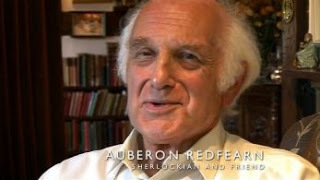
What subset of Sherlockiana really interests you?
The eccentric ideas. The really strange ones that very nearly make sense. Was Mycroft Holmes an early android? Was Edward Rucastle a werewolf? Did Watson have a vestigial tail with which he could fire a secreted gun?
What things do you like to research related to Sherlock Holmes?
I’m not a specialist. I get obsessed with whatever has most recently caught my attention. Recently I had been doing a lot of research into the locations of the stories. Just before the COVID lockdown, I took a trip to the area where Devil’s Foot was set and visited some of the locations David L. Hammer identified.
I wasn’t entirely convinced and ended up doing my own research, which was a lot of fun. So, since then, I’ve been working my way through locations for all the stories. Sometimes they match up with other people’s identifications, sometimes they don’t. Now I’m just waiting for lockdown to be lifted so I can go visit as many of them as possible.
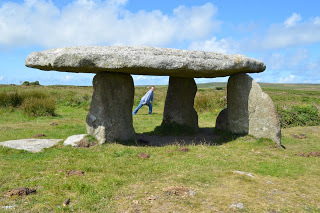
How did the Sherloft come into existence and what are some highlights from it?
The Sherloft is my little den at the top of the house. It was originally a sort of recording studio – I have some chums who come round a few times a year and we attempt to make music. We fail but have fun trying.
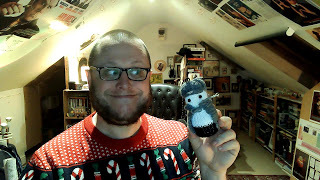
When I started getting into Holmes, one shelf of instruments got turned over to my Holmes bits – a few books and DVDs. But the collecting mania had a hold of me. So the one shelf grew into the entire shelf unit. And so it went on… Soon one entire side of the loft was Holmesian and I still didn’t have enough room. Eventually I gave in, called it The Sherloft and just went with it. I got rid of a few guitars and the sofa that used to be in there and squeezed in as many bookshelves as I could. Now all the wall space I can get to is covered in posters and framed records and every nook is stuffed with Holmesian books and trinkets.
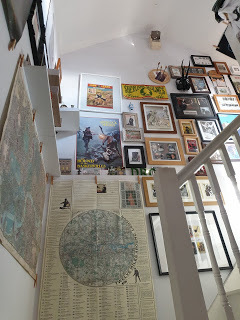
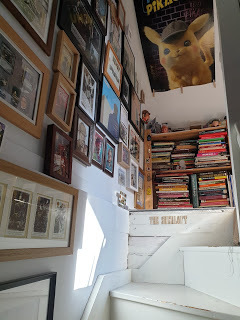
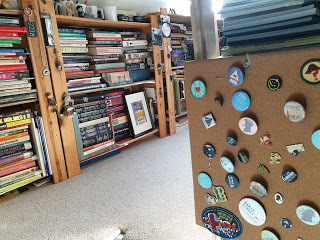
Picking highlights would be difficult. I’m very fond of my Daffy Duck candle holder. But I’m also quite proud of my reindeerstalker that I made for Christmas. But one highlight? I’ll say the dust. I refuse to dust in the Sherloft in homage to Robert Stephens’ Holmes in The Private Life of Sherlock Holmes. He uses the thickness of the dust to date when he acquired documents. I use it to date when I acquired nik-naks.
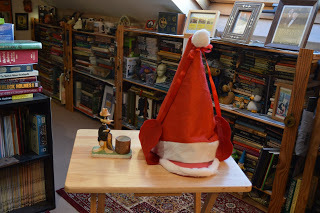
Over the past year, you've put out four books at extremely low prices. How are you able to coordinate such a workload and why is it important to you that the books be so affordable?
There’s always time for Holmesian nonsense. Especially during a lock-down. Finding the time to coordinate projects isn’t a problem. Resisting the urge to do more is the problem.
The books you’re talking about are The Doyle’s Rotary Coffin ones. Doyle’s Rotary Coffin started as just a silly way of celebrating Holmeses that most people aren’t keen on (*cough* Will Ferrell *cough*). But it organically developed into being about inclusivity and encouragement. Those books are about encouraging people to try their hand at writing, sharing as many different ideas as possible and showing people that having fun just to have fun is a good thing. I didn’t want to make a profit from them, I just wanted to share them, so they are on Amazon for the cheapest they allow – I don’t get a penny. But they are also available through the DRC website as free PDFs. I just want to spread fun and encourage people not to get too cross about Holmesian theories they don’t agree with. You can enjoy stuff without agreeing with it.
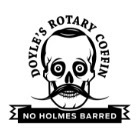
What book would you recommend to other Sherlockians?
There are too many. I could easily list a hundred. If I have to name just one, I’m going to plump for a fiction which I think it is amazing but I don’t hear enough people talk about: The Incredible Umbrella by Marvin Kaye. It masterfully addresses what happened to “Mr. James Phillimore, who, stepping back into his own house to get his umbrella… was never more seen in this world.”
Where do you see Sherlockiana in 5 or 10 years from now?
The future, assuming there is one, is full of so much potential and mystery that it is difficult to say. However, with the assistance of my spirit guide – The Psychic Ghost of Silver Blaze – I have been able to draw back the veil and can reveal what time has in store for us.
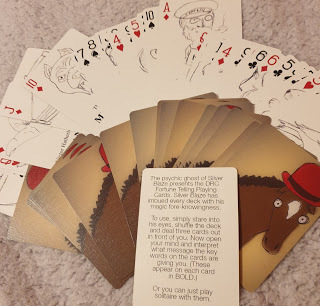
Sherlockiana will be rocked to its foundations by the advent of bio-cybernetics. We will all have robot arms that look like space-Swiss-army-knives. These will connect directly with our brains and, without our knowledge, slowly rewrite our DNA so that we all become two to three inches taller. From this new vantage point, Mrs Ethel Ripley of 2 Hipster Close, Flangehamton will spot a travel-worn and battered tin dispatch-box on top of her wardrobe. She will get it down and discover it has “John H. Watson, M.D., Late Indian Army” painted upon the lid. With trembling hands, she will slowly open the box, only to discover it is packed full of an even worse strain of COVID.
Or, in short, I have no idea. Can’t wait to find out, though!

January 24, 2021
Interesting Interview: Ross Davies
I wonder if Ross Davies ever sleeps. As a Sherlockian, the man seems to know no end. He makes literary maps, he curates a website of Sherlockian toasts, he designs bobbleheads and tchotchkes, he oversees Baker Street Irregulars events, he publishes The Baker Street Almanac every year, he has appeared in more Sherlockian publications than I can count, and he just put out a new book of scholarship last month, Holmes Reads Holmes. And that's just what he does for his hobby!
To pay the bills, Ross is a law professor at George Mason University, which I can only assume takes up at least as much time as his Sherlockian activities. From conversations we've had about education, I can tell that Ross puts a lot of thought into what is best for his students and what will help them succeed during and after their tenure in his classes.
But wait! There's more! Ross Davies is the editor of a law journal, The Green Bag, is on the steering committee of the Nero Wolfe society, The Wolfe Pack, and is a SABR award-winning author. (If you are a baseball fan, you realize that this might be the coolest thing I've ever typed.)

How do you define the word “Sherlockian”?
Anyone who enjoys any part of Sherlock’s worlds.
How did you become a Sherlockian?
Long ago in the quiet of the world, when there was less noise and more green, the Davies family spent large chunks of the summertime camping. In the tent (which was at that time yellow and huge and smelled like adventure, and is today still yellow), before lights out, our mom would read to my sister, my brother, and me.
She covered a pretty wide range of material, and some of it was Canonical. I remember most vividly being terrified by “The Adventure of the Speckled Band” and awed by “The Valley of Fear.” Since then, much sleep has been lost courtesy of Arthur Conan Doyle, some of it reading, some of it lying awake and afraid in the dark. My dedication in the book “Holmes Reads Holmes” is to Rachel S. Davies. That’s mom, who is, by the way, the coolest person in the world.
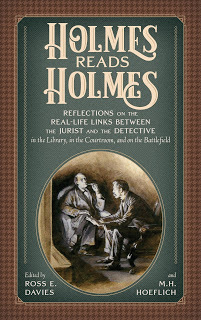
What is your favorite canonical story?
It varies with the moods of the reader. Right now, “The Adventure of the Yellow Face” (my favorite illustration from the first printing is currently on the landing page of the Baker Street Almanac). The story is filled with love, misunderstanding and then understanding, and humility, and it concludes with an admission of imperfection of judgment by the best and wisest man Dr. Watson ever knew. We could all do with a whispered “Norbury” in our ear from time to time.
Who is a specific Sherlockian that you think others would find interesting?
A double answer is required. In alphabetical order by first name they are Crystal and Heather, and by last name they are Holloway and Noll. They are the brains and hearts behind 221B Con, and while it has always taken a great deal of both to make that con happen, the year 2020 proved that Heather and Crystal are superheroes. And chatting with them is a trip!
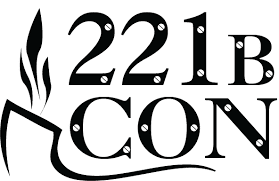
What subset of Sherlockiana really interests you?
Scions and other Sherlockian-Doylean organizations – their histories and their cultures. I would love to read more published histories of them. We’re trying to do something about that with the Baker Street Almanac. In recent years, Monica Schmidt (the BSA’s Editor of Scionical and Societal Reports (U.S.A.)) has been gathering annual news about groups in the U.S.A., and starting this year, Jay Ganguly (the BSA’s new Editor of Scionical and Societal Reports (Global)) is doing the same work for many other parts of the world.
In addition, we’ve been enlisting knowledgeable people to write full histories of some of the major, longstanding pillars of the Sherlockian-Doylean world. Julie McKuras wrote a history of The Norwegian Explorers for the 2019 BSA, and Steve Doyle wrote about Wessex Press for the 2020 BSA. I am happy to report that we will be continuing this in the 2021 BSA with something from Cliff Goldfarb about the Arthur Conan Doyle Collection at the Toronto Public Library.
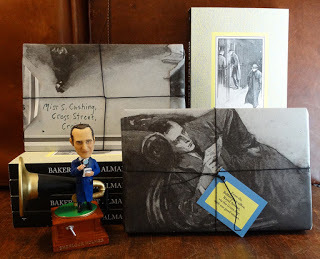
What things do you like to research related to Sherlock Holmes?
Where things are – reading maps and making maps. Many other things are distractingly interesting, of course (we all have too many Sherlockian interests?!), but maps will always be special. If you’d like to see a recent one, here is “The Adventure of the Resident Patient”
What was the impetus for starting The Baker Street Almanac?
Finally, an easy question! The Green Bag, Inc. – the little non-profit company that publishes the BSA -- actually specializes mostly in law-related publications. One of those publications is the “Green Bag Almanac & Reader,” which is an annual review of law and legal writing.
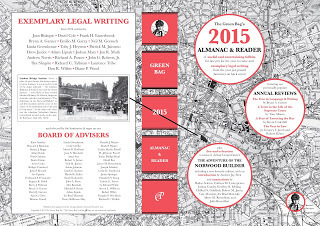
We have always added a bit of extra interest and entertainment to the “A&R” by including material related to some literary-cultural theme. For many years, we chose a new theme each year, ranging from baseball to Shakespeare, from breakfast to Thomas Nast, from presidential elections to Sherlock Holmes. It was that last theme that caused us trouble. We published a Sherlock-themed A&R in 2015. Reader response was so extraordinarily positive, and demands for a sequel so numerous and emphatic, that we violated our tradition of variation, postponed a planned whist-themed A&R, and put out a second Sherlock-themed edition in 2016.
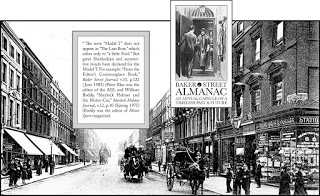
There was plenty of demand for a third round of Sherlock, but enough was enough. In 2017 we published a long-planned A&R tribute to Thurgood Marshall, and in 2018 we finally put out our whist book. In other words, we moved on from the idea of another Sherlock-themed A&R. But many of our readers continued to pester us to do more. A publisher that ignores its readers is in great peril, and the Green Bag is a wimpy enterprise. Enter the BSA. In early 2018 we issued a small pamphlet to raise awareness of the project among prospective authors and readers. The response was good. We published our first big BSA in 2019, our second in 2020, and our 2021 edition will be in print in a few weeks.
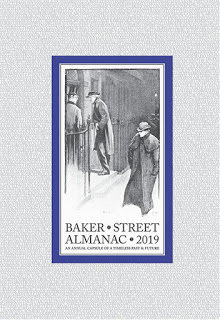
As the overseer of the BSI outings, what do you look for when putting together such events?
Many things! I’ll mention two. First, balance. Our community is built on appreciation of the Canon, and also on appreciation of each other – on appreciation of both scholarship and of friendship. A successful BSI conference is a weekend devoted to cultivating both, and that means striking a balance in the schedule between formal presentations, organized activities, and informal social time.
We could, of course, easily fill two days with presentations, and two days with activities, and two days with eating and drinking and chatting with friends old and new. Alas, the six-day weekend appears to be something for which the world is not yet prepared, and so we invest a lot of effort in making difficult choices about what to do and not do in pursuit of an Irregularly well-balanced weekend. Past organizers have done a mighty good job, and I hope we can keep that going in the future.
Second, novelty. Historically, organizers have also done exceedingly well when it comes to picking new and interesting themes and locations, and also arranging for presentations of new, widely appealing, and previously unpublished and unpresented scholarship. Ensuring all of that interesting freshness is as difficult as achieving a pleasing balance. And again, I hope we can keep that going in the future.
What book would you recommend to other Sherlockians?
Picture books are always good, and Sarah Obermuller-Bennett’s “A Study in Postcards: Sherlock Holmes in the Golden Age of the Picture Postcard” is a great one. I hope she writes a sequel.
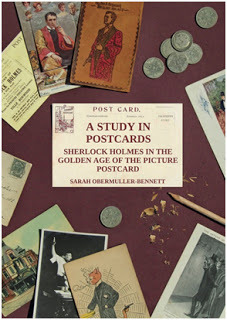
Another extraordinary excellent bookish item that I especially admire is not, strictly speaking, a book itself -- is a hard-to-find supplement to Leslie S. Klinger’s superb “The New Annotated Sherlock Holmes.” It is here and it is free.
Where do you see Sherlockiana in 5 or 10 years from now?
Mars. I dearly hope that NASA decides that the best astronauts to send on the first mission to Mars are small old people (cheaper to transport, less to lose), and that when the first of them steps onto the red planet they say something like, “One sight for this small, near-sighted person to see, and one vast vista for all of visionary humanity to observe.” That, at least, is the plan. And there has been some progress already.

January 18, 2021
Interesting Interview: Carla Coupe
Carla recently took over as Head Light for the Beacon Society, and I'm very excited to see where her leadership takes an already fantastic organization. She recently retired from Wildside Press, a publishing house that has put out some really great Sherlockian titles over the years, and has also done her fair share of Sherlockian writing, penning short stories for Sherlock Holmes Mystery Magazine back in the day, and is an all-around mystery fan, writing two Agatha Award nominated short stories.
You could see why I'd thought Carla was already invested. She's definitely got the credentials! But Carla is more than just her resume. To know Carla is to love her. Her no-nonsense attitude is quietly overshadowed by her smile makes you want to give her a big old bearhug! Carla is wickedly funny and very friendly, a wonderful combination. So let's enjoy our first Interesting Interview of 2021 with Carla Coupe!

How do you define the word “Sherlockian”?
Easy. Anyone interested enough in Sherlock Holmes to read/watch/listen to anything Sherlock Holmes related is a Sherlockian.
How did you become a Sherlockian?
The usual way, I suppose. I read my first story at around 10 and then devoured the Canon. In my early teens I dragged our “portable” B&W TV into my bedroom and balanced it on a swaying TV tray every Saturday night to watch the Rathbone and Bruce movies on the late-late-programming. For many years, although I still periodically re-read the Canon and watched the occasional Holmes movie, I focused more on general mysteries. In 2009, I was asked to join Peter E. Blau and Dan Stashower on the Diane Rehm show to discuss HOUN (my favorite), and that re-kindled my interest in the world of Sherlock Holmes and Sherlockians. I joined Watson’s Tin Box of Ellicott City in 2013 and traveled up to the NYC Birthday festivities the next year. From there it was all downhill.

What is your favorite canonical story?
HOUN. Not only for the delicious Holmes and Watson interactions, but also for the descriptions of Dartmoor and the splendid gothic atmosphere. My ASH moniker is “The Footsteps of a Gigantic Hound.”
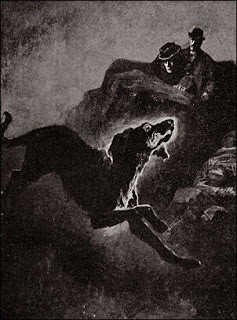
Who is a specific Sherlockian that you think others would find interesting?
Tough question. There are so many, but I’ll choose Dana Cameron (The Giant Rat of Sumatra). In addition to being wicked smaht (yeah, she’s from Boston), she’s a talented writer and all ’round fascinating person. Buy her a good single malt and you’ll be entertained the whole evening.

What subset of Sherlockiana really interests you?
I admire those who have the space and funds to be collectors, but since I’m in the midst of doing Swedish death cleaning…. Hmmmm. Probably the world and British events referenced throughout, many of which were current when Watson was penning the Canon. My graduate and undergraduate degrees are in British history, so mention a date or event and I start sniffing around like a bloodhound. I can’t help it.
What things do you like to research related to Sherlock Holmes?
I’m fascinated by domestic history and items, so much of which is ephemeral—re-used and re-purposed until it disintegrates. Fabric and cheap pottery, as examples. The only reason earlier periods are called the stone age and the iron age is because stone and iron have lasted to the present day, whereas cloth and leather and pottery have not. The lives of the subjugated (or oppressed, if you prefer) and especially the lives of women have often been ignored or minimized in traditional historical studies. There are many stories of women, or servants in general, to mine in the Canon, I wrote a pastiche about Agatha in CHAS, because I felt that Holmes’ use of her in the case was not his finest moment and she deserved better.
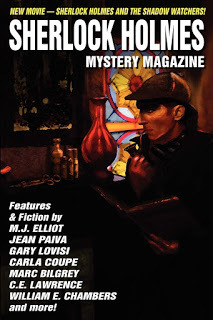
You transitioned from being a Sherlockian short story writer to a Sherlockian publisher with Wildside Press. How did your experiences as a Sherlockian differ on either side of the desk?
In addition to all the other elements required to be a decent editor, I became more particular about period authenticity. If you’re going to write an alternate history—steampunk, whatever—that’s fantastic and I say go for it. But it must be clear from the outset that this is what you’re writing. Non-period dialogue, items, events, and plots in a pastiche immediately throw me out of the story. Decide what you’re writing and if you want it to be authentic, do your research.
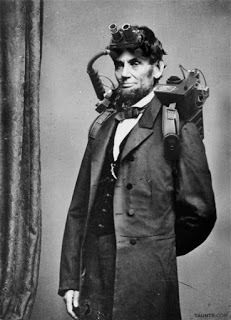
As the new head of The Beacon Society, what are your plans for the group?
I’m fortunate that the Head-Lights who came before we did so much of the real ground-work. We have many excellent programs in place: the Susan Z. Diamond Beacon Award, the Jan Stauber Grants, the Fortescue Scholarship Exams, and the Junior Sherlockian Society. We’ve recently added the R. Joel Senter, Sr. Essay Contest and Sherlock’s Spotlight, a gazette for young Sherlockians. One of my goals is to continue to expand support for and access to these programs. Like so many organizations, we’re keeping watch on the pandemic situation and will adapt our programs if possible and as necessary.
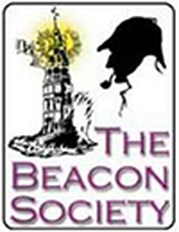
What book would you recommend to other Sherlockians?
Jeez, why don’t you ask me a difficult question? </sarcasm> What appeals to you? Pastiche? Scholarly article? Essay? A book I love that you can dip into at your leisure is A Curious Collection of Dates: Through The Year with Sherlock Holmes, by Leah Guinn and Jaime N. Mahoney (Gasogene Books). A delightful way to progress through the year with meaty nuggets of canonical information.
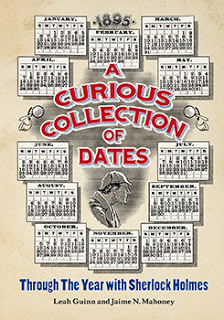
Where do you see Sherlockiana in 5 or 10 years from now?
I hope younger folk and those entering the fandom provide an impetus to keep things fresh with new groups, new leaders and influencers, and hopefully new takes on the Canon through pastiches, comics, graphic novels, movies, TV shows, podcasts, etc. Of course we should celebrate the history of Sherlockians and their activities, but if we don’t pull in vigorous new blood, all that’s been built will fall into disuse and be forgotten, and that would be a shame.
January 1, 2021
Looking Over My Notes [NORW]
This wraps up my fourth year blogging at Interesting Though Elementary. If you’ve been following along since the beginning, God bless your intrepid and patient soul. I used to start off the year with Sherlockian resolutions and end each year with a review of how well I did and a separate post of all of the Sherlockian books I read in the year, but like the rest of the world in 2020, things changed. So this will be my catch-all post for the year: a look back at Sherlockiana like one I've never seen before.
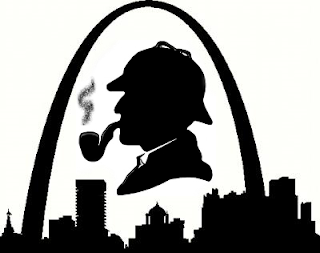
My biggest Sherlockian love is my home scion, The Parallel Case of St. Louis. I won't take up too much space here going on and on about what a year we had, but if you're interested in those thoughts, I've posted it on our group's blog, The Parallelogram.
Looking back on 2020, I was a busy Sherlockian! As if the day-to-day Sherlockian discussions on Twitter and keeping up with the Parallel Case of St. Louis's Facebook page weren't enough to keep me busy, I took on some big projects.
Writing and Editing
For the past six years, I've been teaching a two-week unit on Sherlock Holmes to my fifth graders. Over the past year and a half, I've worked on turning that into a book that would make some of the original canonical stories accessible to fourth to sixth grade readers, along with accompanying information that I present to my class. After a ton of work and great feedback from non-Sherlockian teachers, I finally finished that project in November! The publishing world slows down dramatically at the end of the year, so shopping this project around to literary agents will begin in earnest in January.
And another book project wrapped up this year as well! My friend, Peter Eckrich, reached out to me last year about doing something with the specifics of Sherlockian collecting, and over the following months, we were able to recruit some amazing folks to work with us. During the first half of this year we finished up a great anthology on Sherlockian collecting titled The Finest Assorted Collection. In this book, 27 Sherlockians have written essays about their specific niche collections. Spending so much time working with these folks was one of the real highlights of my year and I found that I really love editing! (Maybe not so much with my fifth graders, but Sherlockians are much easier to work with.) The book was pitched and accepted by Wessex Press and is set for a publication in January 2022. So even though Rebecca Romney cited it a few times in her Toronto talk a few weeks back, we will all have to wait a while to read about these interesting collections!
And speaking of editing, I got to work with some of my favorite Sherlockians on their own projects. Bill Cochran, Heather Hinson, and Brad Keefauver all have some amazing things coming, and I feel very blessed that they let me have a peek behind the curtain in their creative processes.
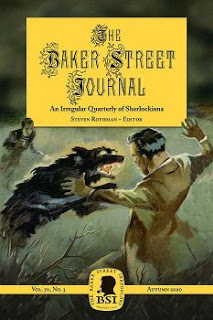
Another writing project included something I've been working towards for years.... I'm getting published in the Baker Street Journal! An article I wrote on organized crime has been accepted for publication in 2021, which thrills me to no end. If I never write another thing, I will have had something in the BSJ. ...swoon...
Some other fun and exciting projects included a history of The Beacon Society for Ross Davies's amazing Baker Street Almanac, an article about Charlie Peace for The Serpentine Muse, a piece of fiction being accepted and held for future publication in the Sherlock Holmes Journal, an alternative take on A Study in Scarlet for The Watsonian, and an essay on curried mutton to an upcoming project that Margie Deck and Nancy Holder are heading up for Belanger Books, Sherlock Holmes of Baking Street.
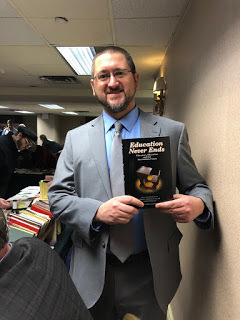
And one of my pieces of work from last year was published this January, converging my two biggest interests, Sherlockiana and education. I was very honored to be a part of the latest book in the BSI Professional Series, Education Never Ends: Educators, Education, and the Sherlockian Canon. It debuted in the dealer's room of the BSI Birthday Weekend WHICH I GOT TO GO TO THIS YEAR!
Remember January? It seemed so long ago....
Events
I posted daily recaps of my excitement at being part of a huge weekend full of Sherlockians earlier in the year (Day 1, Day 2, Day 3, Day 4), but thinking back on that trip can still make a smile creep across my face. So, so many great people spending time together. Whether it was formal presentations or chats in the hotel lobby, my first Birthday Weekend will always be a top Sherlockian memory for me.
Once all of the scions meetings went digital, I started out trying to go to as many as I could, but as a teacher who has been bouncing in and out of remote learning for ten months now, I learned pretty quickly that there was no way to attend as much as I would like. I just didn't have the stamina for it. But man, did I enjoy the ones I got to go to and always look forward to what's coming up on the calendar, whether or not my eyes and psyche will allow me to attend.
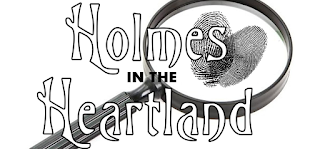
Other events had to be cancelled (Holmes, Doyle, and Friends, 221B Con) or postponed (Holmes in the Heartland), but others took to Zoom. Scintillation of Scions set the standard with their Zoom format and happy hours, that was soon used by other fun events like Sherlockian Saturday at the Pratt.
And 2020 saw my debut as a Sherlockian speaker as Elinor Gray shepherded me through fear of public speaking and I gave a talk at the Left Coast Sherlockian Symposium. Because of that presentation, I was invited to be the keynote speaker at this year's Norwegian Explorers of Minnesota's Christmas Dinner. Both audiences were absolutely lovely and made public speaking slightly less terrifying. But they were both audiences full of Sherlockians, so of course they were great!
Interesting Interviews
Hands down, the most rewarding Sherlockian activity this year was posting interviews on this blog with Sherlockians that I find fascinating. And judging from the comments on Twitter and Facebook, I'm not the only one that found these folks engaging. There are so many Sherlockians out there that it's easy to overlook or not hear of some of the great energy happening in our hobby, and I have absolutely loved giving folks in the spotlight. These have proved so popular that I bumped it up from one to two each month and plan to continue that pace into 2021.
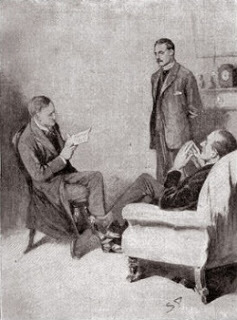
January 2020: Elinor Gray
February 2020: Bob Katz
March 2020: Monica Schmidt
April 2020: Susan Rice
May 2020: Burt Wolder
June 2020: Jay Ganguly
June 2020: Laurie King
June 2020: Steven Doyle
July 2020: Mike McSwiggin
July 2020: Jacquelyn Morris
August 2020: Jerry Margolin
August 2020: Charles Prepolec
September 2020: Maria Fleischhack
October 2020: Mike Ranieri
October 2020: Julie McKuras
November 2020: Mark Jones
November 2020: Sonia Fetherston
December 2020: Crystal Noll
December 2020: Greg Ruby
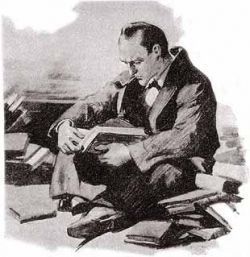 Books Read
Books Read2020 gave me plenty of time to read, and I hit about 295 books and journals this year. Obviously all of them weren't Sherlockian, and I won't bore you with all of them, but here's a quick synopsis:
30 stories from the Canon
31 issues of The Baker Street Journal
32 other journals including The Holmes and Watson Report, The Serpentine Muse, The Watsonian, Canadian Holmes, The Norwegian Explorers' Christmas Annuals, The Newspapers, Baker Street West
26 scholarly books
14 pastiche & parodies
12 books about Sherlockian history
...and 3 books from Doyle's Rotary Coffin, they defy categorization
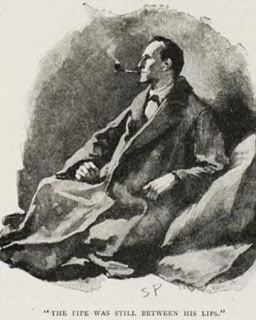
2020 has definitely been a challenging year on many fronts, but looking back I am so grateful for the community of Sherlockians out there. Everyone in this hobby has gone above and beyond to help one another out and keep our minds from the world outside. Even though most of us spent the year using technology more than ever before, plenty of times we were able to say it's still 1895.
December 27, 2020
Interesting Interview: Greg Ruby
When the world went awry in March, Sherlockiana was put on pause. You may have noticed that this is not the norm anymore, and that is thanks in large part to Greg Ruby. Greg stepped in and quietly started running events and meetings via Zoom, happy to show any reticent Sherlockian that virtual meetings weren't scary. If it weren't for Greg and a few other technologically adept Sherlockians out there, we may have reverted to sending telegrams to keep our Sherlockian activities alive!
So who is our hobby's Mr. Wizard? First of all, Greg is an absolutely great guy. Always happy to welcome folks to any conversation he's a part of, Greg's Sherlockian energy seems to know no bounds. He's running THREE big scions, putting out an annual journal, and showing up to as many scion meetings as he can (of which he is a member of 23!). And like I said, he's the man behind the curtain for so many major virtual events, including this year's Scintillation of Scions, A Saturday with Sherlock Holmes, and January's official BSI Birthday weekend events. Greg is a beehive of Sherlockian activity, and one that doesn't get enough recognition for what he's done for us this year. So, I think it's very fitting that I'm ending 2020's Interesting Interview series with the most important Sherlockian of 2020, Greg Ruby!

How do you define the word “Sherlockian”?
I consider anyone with a interest in Sherlock Holmes as a Sherlockian. My definition is somewhat broad to include fans of some of the recent movies and television shows, as well as pastiches.
I was at a Sherlockian meeting in pre-COVID times where a first-time attendee admitted to never reading one of the 60 stories but enjoyed watching Elementary episodes on television. Another attendee scolded that person telling them everything wrong, in their opinion, of the series. The first person never has returned to that club, but thankfully has attended other groups since and is working their way through the Canon.
Anything that introduces others to Sherlock Holmes is a good thing. I’m not particularly enamored with most pastiches but I know of several folks where that was their introduction to this wacky world of ours.
Of course, there are various levels of being a Sherlockian from the casual to the hardcore, and most settle into a level that suits them, which is great. Then there are the chronologists, but we’ll save that for another time….

How did you become a Sherlockian?
I was introduced to Sherlock Holmes in Mrs. Raver’s reading class in fifth grade. With some reservation here, I now admit that it is the only thing I remember from that year, including having to memorize some poem to be later recited.
In the years that passed, I would pick up some related volumes – gathering enough so they took up an entire shelf on the bookcase in my first apartment. A friend gave me a copy of Baring-Gould’s Sherlock Holmes of Baker Street after seeing my shrine to Holmes. Still remember reading about the Baker Street Irregulars and playing the Game, thinking what a bunch of wackadoodles these folks were. There was no thought that 25 years later I would be dining with those wackadoodles annually.
Let’s fast-forward to Christmas of 2013. I severely broke my right ankle that day and would spend next 5+ months laid up in bed. A month before my accident, I rearranged my bookshelves to relocate my Holmes material to be within reach of my bed, otherwise it would have been Tom Clancy stories I would have been reading. Having some free time, I went online and discovered a Sherlock Holmes event was coming up in my area.
I would attend Scintillation of Scions that June, followed by my first meeting of the Six Napoleons of Baltimore a few days later. Each event / meeting that I would attend had other Sherlockians inviting me to attend other scion functions. By the end of that first year, I was travelling several hours away from Baltimore to northern New Jersey and other cities to talk about Sherlock Holmes with my new friends.
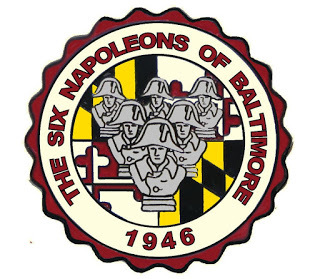
What is your favorite canonical story?
My favorite of the 60 stories was also my first story – “The Adventure of the Three Garridebs,” so my fifth-grade reading class was not a total loss. In fairness, this was around the same time I had started collecting coins, and I was enthralled by the inclusion of a counterfeiting money element in the story. This was reinforced with my next story of “The Red-Headed League,” dealing with the possible theft of gold French coins. There was a letdown when I then read “The Speckled Band” and there were no references to coins or money in the tale.
Dan Payton of the Great Alkali Plainsmen likes to tell the story that I cornered him after his presentation during the summer 2019 conference of the Norwegian Exploders of Minnesota, where he made an offhand comment criticizing 3GAR. I pointed out two reasons why he was wrong.
Holmes first appeared on television in 1937. They had their pick of all 56 short stories and would obviously choose the best story for that first broadcast. They chose 3GAR. Likewise, when the Granada / Jeremy Brett series aired “The Mazarin Stone,” they combined it with 3GAR to salvage the episode.
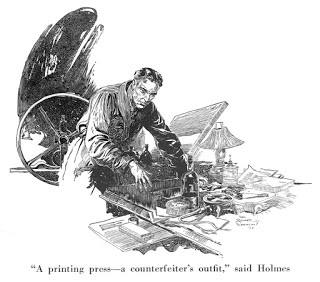
Who is a specific Sherlockian that you think others would find interesting?
This is an unfair question in my opinion, as I have found every Sherlockian that I’ve met to be interesting. Since I have to answer with only one name, let’s go with my BSI 2019 classmate, Ira Brad Matetsky. IBM is a trial lawyer, based out of New York City, that I first met at the running of the 2015 Silver Blaze race at Saratoga (later leading us to be involved with recently published BSI volume Upon the Turf) where we had a wide ranging conversation that afternoon. I was amazed when I learned he was on the Wikipedia Arbitration Committee. An admirable Sherlockian with a wicked sense of humor in bad puns, he serves as the Werowance of the Wolfe Pack, the literary society for Nero Wolfe and Rex Stout fans.
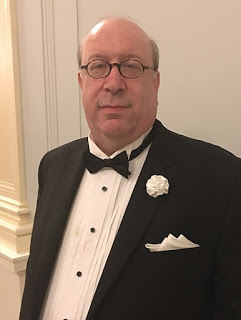
What subset of Sherlockiana really interests you?
Being a coin collector, that was the first subset that appealed to me. In the years since becoming active in Sherlockiana, I have branched out into what I call the pop-culture media. I actively seek out the old-time radio recordings and film/TV appearances with references to Holmes, skipping most of the fan-made material that is appearing on YouTube.
During the pandemic, I’ve started looking for cartoon versions of Holmes – editorial, daily comic strips and comic books – where it’s obvious who they are referencing.
But the biggest interest are the Sherlockian friends that I’ve made over the last six years.
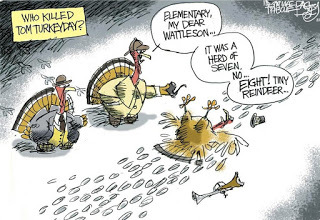
What things do you like to research related to Sherlock Holmes?
The biggest research item are coins and other numismatic items with Sherlockian themes. When The Fourth Garrideb group was formed, we were aware of about 75 collectable items and thought it would be great to get up to 200 items. We are now at over 400 items cataloged.
In a related item, I have begun researching Louis Hector, the first actor to portray Holmes on television, with his stage and radio acting career.
I also enjoy doing some research regarding the old-time radio broadcasts. Before the pandemic, it appears that I stumbled across several recordings of the old Richard Gordon episodes from the early 1930s that have been forgotten. Hopefully, when things return to normal after the pandemic, I’ll be able to confirm these episodes.
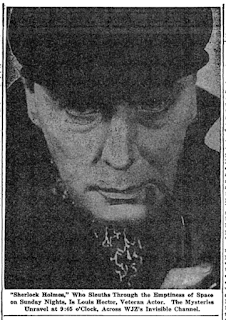
For those of us outside of central Maryland, what is the difference between Baltimore's two scions, The Six Napoleons of Baltimore and the Sherlockians of Baltimore?
The quick answer is about 70 years. The Six Napoleons will be celebrating 75 years in September 2021 without any long hiatuses like many other groups have experienced over time. From its founding in 1946 until December 2017, the group was strictly males only for membership. After attending three meetings, attendees undergo a examination, lovingly (?) referred to as the Inquisition, where three Napoleons test the neophyte’s knowledge of the 60 stories. After the Inquisition, the now Postulant is expected to give a presentation at a future meeting and is then installed as a Napoleon.
The Sherlockians of Baltimore was formed in 2016 as I was being greedy – I wanted more Holmes than just a quarterly meeting of the Napoleons. Originally, I hoped to jumpstart the Carlton Club of Baltimore, the co-ed alternative to the Napoleons. Founded in 1971, the group had gone inactive before I came into the Sherlockian scene in 2014. After spending 18 months trying to track down the leadership of the Carlton Club and being frustrated at every turn, I brazenly announced a relaunch of the Carlton Club in February 2016. Within days of my announcement, word funneled down to me that they were still “active.” So, we changed gears, and launched the SOBs in May.
While I love the group names of the Speckled Band, the Copper Beeches, and other Sherlockian groups, I thought it be wise to have a straight-forward name of who and what we are to attract those not as familiar with the stories, and serve as a feeder system into the Napoleons and nearby Watson’s Tin Box.
Anyone who attends a SOB meeting is automatically considered a SOB and a member. After attending two physical meetings, they are issued a membership card so that they are now a “card-carrying SOB”. Giving a presentation, leading a story discussion or preparing a quiz earns the status of a “Certified SOB” with a Baltimore-themed moniker. As opposed to meeting on a weeknight at 6 pm, the SOBs gather on Saturdays at lunchtime in hopes of more attendees might be able to attend.
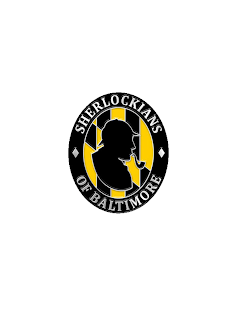
How did The Fourth Garrideb come about?
The early months of 2014 found me with lots of free time as I recuperated. While rereading the Canon, I remembered a conversation with Ed Rochette back during the 1994 American Numismatic Association’s World’s Fair of Money in Detroit. Ed was a longtime coin collector, who also served as a consultant to the Pobjoy Mint who had just a struck a series of Sherlock Holmes coins for the principality of Gibraltar. Ed had asked about an elongated cent my local coin club had rolled with a Sherlockian design (I had nothing to do with the design!). I promised Ed a sample and we went on to discuss forming a group of Sherlockian coin collectors. I was just starting my professional career and Ed was juggling several projects, so nothing happened until 2014 while I was stuck in bed.
I tracked down Bob Fritsch, a fellow longtime numismatist in New England who I also knew to be a Sherlockian, and bounced the idea off him. He liked the idea, so I arranged for a meeting space at the 2014 ANA event in Chicago. Seven of us crazy people showed up and joined on the spot, with Bob suggesting the name for our group. Six years later, we have over 100 members throughout the US, Canada, Europe, Australia and South America.
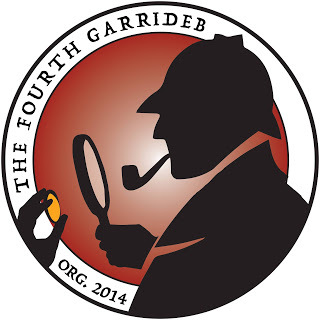
What book would you recommend to other Sherlockians?
Jack Tracy’s The Encyclopedia Sherlockiana has been a lifesaver for me, explaining terms that I encounter while reading the Canon. A more fun recommendation, and a delightful read, is A Curious Collection of Dates: Through the Year with Sherlock Holmes by Leah Guinn and Jaime N. Mahoney. Curious about what happens on a given day in the world of Sherlockiana? The book is my go to source before I attend any club meeting and has led me down many a research project.
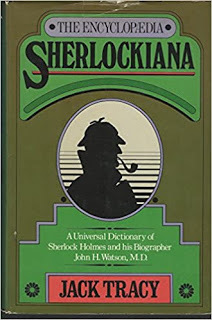
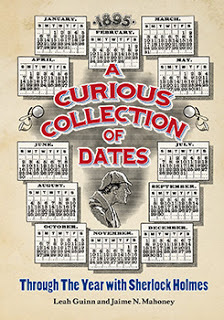
Where do you see Sherlockiana in 5 or 10 years from now?
The world of Sherlockiana will still be growing strong in the next decade. It will be interesting to see how we continue to incorporate the virtual elements into events as we move forward. While it is a poor substitute for being face to face with friends, I am now spoiled by being able to dial into meeting and events to talk about Holmes with new friends internationally. I expect that many groups will try to work this technology into future events.
Likewise, with the remaining stories coming out of copyright protection in the next few year, I expect to see more pastiches and adaptions coming forward. If the Enola Holmes stories lead to more films and the long-promised Robert Downey Jr. third film happens, there will be a steady flock of new Sherlockians.
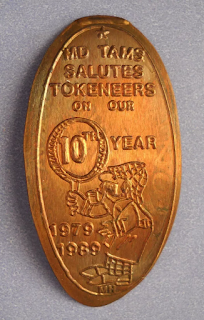
December 20, 2020
Interesting Interview: Crystal Noll
If you've been around Sherlockiana at all over the past ten years, you've heard of Crystal Noll. Crystal is the co-founder of the wildly popular 221B Con and co-editor of The Serpentine Muse, the journal of the Adventuresses of Sherlock Holmes. And that last sentence really shows her versatility in our hobby. Crystal is in the forefront of new Holmes adaptations (she and Heather Holloway had a great interview talking about Enola Holmes on the Glitchy Pancakes podcast) but also embraces historical Sherlockiana.
Her friendships with longtime Sherlockians show that old and new worlds can co-exist and have fun while doing so! While Crystal is an absolute workhorse, she is also one of the most fun people out there. Whether you're having a few drinks or engaged in a spirited conversation online, Crystal makes it fun. So settle in and get ready for a wickedly smart and delightfully entertaining interview with a sparkplug of Sherlockiana, Crystal Noll!
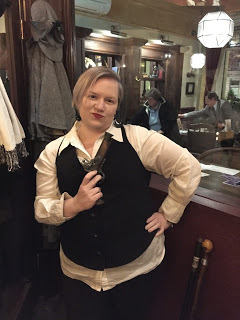
How do you define the word “Sherlockian”?
That is quite the question isn’t it? In fact, it has been the topic of many a debate in Sherlockian circles.
Personally, I think that anyone who considers themselves a Sherlockian is one. Full stop. I know I’ll get some Twitter DM or Facebook message where someone disagrees with me, and that’s okay because many people consider being a Sherlockian at the core of their identity. And that is exactly my point.
‘Sherlockian’ is a label that we claim or is granted to us, like mother, father, friend, scholar, T-bird, Pink Lady, Adventuress, Irregular, etc. If you’re so connected to it that you’re willing to hang it around your neck, then I assume you’ve got some sort of personal credentials and that you deserve it: even if those credentials are that you really like it.
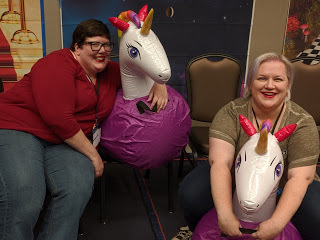
How did you become a Sherlockian?
I wasn’t lucky like all the people whose parents handed them a copy of the canon as a child and not being in any of the gifted classes, none of my teachers assigned Sherlock Holmes. So like so many memories in my adult life, it can be traced back to my unlikely friendship with Heather Holloway.
We were returning to our alma mater, Georgia Southern University, to hear Angela Davis speak. Driving down I-16, Heather asks me if I know if our hotel has PBS, because there was a modern version of Sherlock Holmes airing that night. She just knew it wasn’t going to be any good, but had to see it anyway. One phone call later, and yes, the HoJo had PBS.
We go to the fascinating talk and to hang out with friends after… here’s when you realize that we aren’t really good people. We lie to leave the get together early so we can rush back to the hotel and tune in.
We weren’t even out of John Watson’s flat before I was hooked.
Later, we went to the Waffle House, like you do in the south, for a late night dinner and to talk about the show. We were lamenting that we’d have to wait another week when I had my “eureka” type moment.
“This has already aired in the UK?” I asked.
“Yes,” said Heather.
“Well, we have the internet” I said.
Don’t fret BBC executives who may be reading this. I promise that you have gotten so much of my monies… we’re good. Promise.
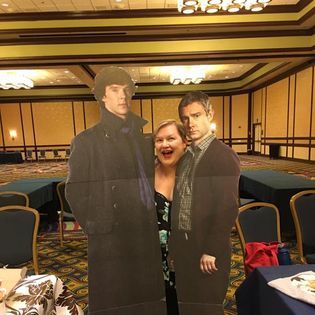
What is your favorite canonical story?
I actually have two, and my favorite is dependent on whatever mood I am in at the time.
The first is DANC. I mean, what’s not to love about it? It’s got a cypher, two(ish) love stories gone wrong, AND a connection to organized crime, which has always fascinated me.
The second is EMPT. For some people this is going to be something they are going to scroll past quickly because they’ve heard me say it before. I think we all connect with Sherlock Holmes because there is something or someone in the stories that we see a bit of ourselves in.
Initially, for me was John Watson. While I was never, and will never be, a medical doctor or in the military, there is something about his personality and character that spoke to me. As I was reading EMPT I came to realize that Sebastian Moran was the antithesis of Watson, so it is no surprise that I became intrigued by this semi-one off character.

Who is a specific Sherlockian that you think others would find interesting?
Oh bless your heart. You want only one.
Sheclockiana is full of interesting people and has given me so many friends (and so many wonderful memories), so picking just one is hard, but I am going to go with Roger Johnson.
I don’t know how many people know, but on top of his being both a scholar and a gentleman, he is also the editor of The Sherlock Holmes Journal and the curator of the Museum within the Sherlock Holmes Pub on Northumberland Avenue. Whenever I get back to London, I try to always make time to meet up with him and Jean Upton for a chat. It is definitely not to be missed.
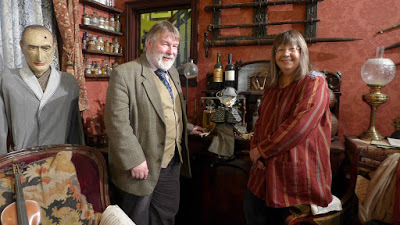
What subset of Sherlockiana really interests you?
I really am intrigued by the “Grand Game,” but not necessarily the way that it was originally intended to be played. I mean, don’t get me wrong. I can tip my hat to the literary agent just as much as the next person, but I like to dig deeper, like many Sherlockians. Which leads to your next question…
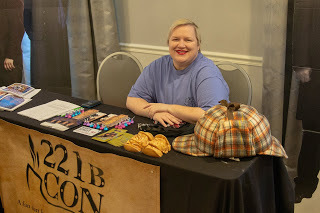
What things do you like to research related to Sherlock Holmes?
I love to spend my time researching Watson’s and Moran’s military lives.
Recently, I have given a talk at Scintillation of Scions and at my local scion, Wisteria Lodge, about Dr. Watson going to war. Since then I have been asked to give one on the schooling and path a modern Watson would take.
I’ve also found myself down the rabbit hole of tracking down Moran’s actual regiment(s) and his movements after being discharged before finding his way to that fateful night he crossed paths with Sherlock Holmes.
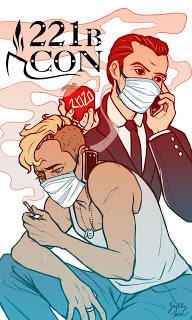
You are one of the co-founders of the wildly popular 221B Con. How did this convention come about?
Well, you see, it started with a Doctor Who convention called TimeGate… actually it was a Doctor Who and StarGate convention, but like so many of these events, they often offer other panels that are on topics that those fandoms are also interested in.
A former BBC employee was giving a talk on Sherlock Holmes media adaptations. I remember walking out of that panel thinking that if I could know half of what he had forgotten about Sherlock Holmes, then I would be set for life.
As the five original directors of 221B and one of our future staff members stood around and discussed the panel, we got to talking about what a Sherlock Holmes convention would have. And I don’t think any of us remember who said it, but someone made the statement “someone should start a Sherlock Holmes con.” Someone else replied, “why don’t we start a Sherlock Holmes con?”
By the time we left the hotel the next day we had a (really questionable) hotel contract, a domain name, multiple social media accounts, and a convention committee (also, no startup capital or any idea how to organize a con).
And that, as they say, is history.
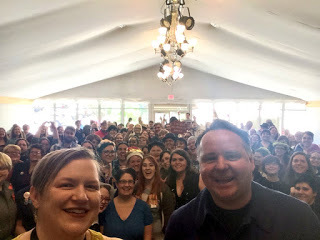
On top of running a huge weekend like 221B Con, you also manage to co-edit The Serpentine Muse! What goes into putting out issues of such a prolific journal?
Crying mostly. Actually, I am totally kidding. I just wanted to say that.
Seriously though, it is an absolute honor for Heather (see? There she is again y’all) and me to co-edit the Muse. So many amazing women have worked amongst those pages, from the days they sat around Evelyn Herzog’s place and literally had to cut out and tape the entries into a journal format through the days Marilynne McKay and Susan Diamond passed over the reins, blood, sweat, tears (and booze from what I hear) have been poured into that journal.
And I am not really sure whether I cried more the day that Evelyn sent Heather and me the email over the invite us to become Adventuresses or the moment she sent the first issue we completed off to the printers. Though I digress, you asked about the process.
With a typical issue, lovely Sherlockians send us articles, toasts, quizzes, art, or photos that they would like to see included in a future edition of the Muse. Heather or I, mostly Heather, will check it out and, if it's right for us, slate it for publication.
When it comes time to start the next issue, which I am sure other editors will agree with us, seems to be right about the time you finish the current issue, we check to see what we have available. We attempt to offer a variety of both short and longer pieces so that there is something to sink your teeth into and palate cleansers alike. Whimsical is always a word we try to keep in mind. If we can make the issues keep to some sort of theme, even better, but that rarely has happened for us.
Each piece is copied into a Google Doc where Heather proofs and gently edit the pieces if needed. If larger changes need to be made, we reach back out to the authors with our requests, which in most cases is usually to break something into multiple parts. We really try not to do more than fix the occasional word if we can help it.
At this time, yours truly, begins to pull together some of the Editor’s Commonplace Book (mostly the calendar and the mentions that get a run every time) and placing the pieces into the blank pages on InDesign.
Once I know how much space the articles will take up, we add in the pictures or any graphics that you see when you open the pages of The Serpentine Muse.
The next step is to fill out our section of the ECB, since at this time we know more about what space we get to use to tell you about either happenings within the Sherlockian world or in general, what we want to babble about that issue.
Heather will then proof it once again; I think to make sure I haven’t accidentally left half of someone’s article or toast beyond the bleed (but that hasn’t happened yet), and then we send it off to Evelyn to go through with her fine-toothed comb. And let me tell you, if you ever need something proofed, she’s the one you should go to. I have no problem admitting that she makes whatever you see when you open that cover better.
At that point, final tweaks are made, and she sends it off to be printed. The magic from there to when you pull it out of the mailbox is all her. You should ask her about it one day (like how I squeezed in a second Sherlockian that people might find interesting?).
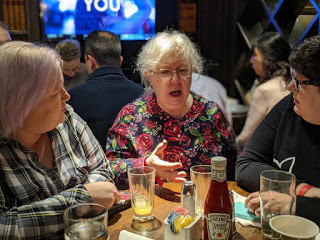
What book would you recommend to other Sherlockians?
This is the question I think I will be judged for more than all others. LOL
If you’re into True Crime, The Devil in the White City: Murder, Magic, and Madness at the Fair That Changed America by Erik Larson is fantastic.
I’m madly in love with the Timothy Wilde series by Lyndsay Faye. If you dive in, tell my boy Valentine “hey.” The Gods of Gotham is the first in the trilogy.
If you want to stay in the Sherlock pastiche realm, The Lady Sherlock series by Sherry Thomas is one of my absolute favorites. Book One is A Study in Scarlet Women.
Really, I will put any book I am reading down or rush through it to have my hands empty when Lyndsay or Sherry release a new book. I just love their styles.
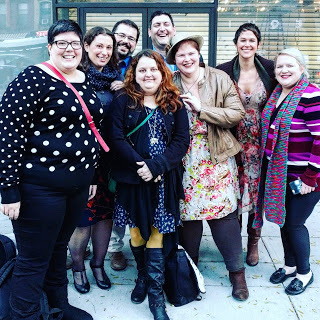
Where do you see Sherlockiana in 5 or 10 years from now?
Truth be told, in five years, I see Sherlockiana looking like it does now, but with a younger demographic.
Ten years, well ten years is where you are really going to see the change. I think people have begun to realize that Sherlockiana isn’t the boys club that it used to be. The wonderful women who have come before us have paved the way for younger generations. Add to that the changing representations of Sherlock Holmes in the media, which means that more women, non binary, POC, and other demographics will feel they are more accepted. IMHO, that’s what it is starting to look like now. It just hasn’t made it to the larger circles yet.
